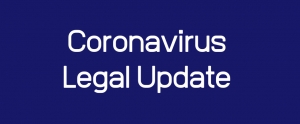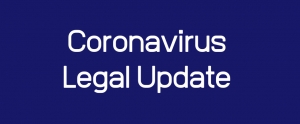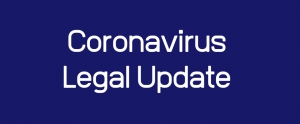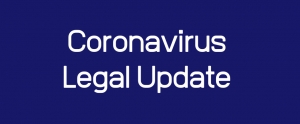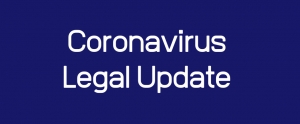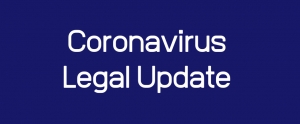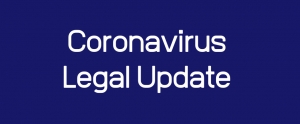2021 Round of PPP Funding: A New Lifeline for Small Businesses is Available Now!
On January 7th, the Treasury Department announced that the Paycheck Protection Program, a unique program that kept many businesses afloat during the initial months of the pandemic, will re-open the week of January 11 for a second round of loans for new borrowers and certain existing PPP borrowers. To promote access to capital, initially only community financial institutions will be able to make First Draw PPP Loans beginning on Monday, January 11, and Second Draw PPP Loans on Wednesday, January 13. The PPP will open to all participating lenders shortly thereafter.The PPP fund provides forgivable loans to businesses, providing they maintain their payroll.
Business Relationships in Times of Crisis
These challenging times present particular challenges to small business. Notwithstanding efforts to stimulate the economy, the fact remains that many businesses simply can’t function at a sustainable level without open doors and customers who require inventory, raw materials or products to sell. Empirical data supports a substantial downturn in gross domestic production such that the federal government has declined to publish economic forecast data for the summer of 2020. Millions have been separated from employment – either temporarily or permanently. Every business and every businessperson has felt the economic effect of the pandemic.
While small business may never be the same, it is not dead. We all know the United States economy is driven by small to medium employers no matter the media focus on big industry. There will no doubt be consolidation in nearly every sector of the economy from construction to retail. History has proven that, for the savvy businessperson, trying times like these bring opportunity. Taking advantage of opportunity requires strong, focused and forward thinking business relationships.
The PPP FLEXIBILITY ACT:
On June 3rd, the U.S. Senate passed the “Paycheck Protection Program Flexibility Act” (the “Flexibility Act”) which had been previously passed by the House of Representatives on May 28, 2020. It is expected that President Trump will sign the legislation today, June 4th. The Flexibility Act provides a number of modifications to the Paycheck Protection Program (“PPP”) provisions of the CARES Act, which will significantly increase the forgivable loan amounts of PPP borrowers. Arguably, the Flexibility Act turns the PPP into more of a small business subsidy/assistance program, rather than a true paycheck protection program.
The Flexibility Act includes the following changes to the PPP:
Bucks County Offer of Small Business Grants Requires Quick Action
Much has been made and reported about the federal government’s effort to sustain the economy and assist working families through programs such as enhanced unemployment benefits and the Payroll Protection Plan. AMM has assisted many small business owners in negotiating the application process and anticipating both documentary requirements and potential financial consequences of the available programs. State and local governments have also offered programs to the business community. Bucks County has now announced the creation of a new grant funding opportunity: the “Bucks Back to Work Small Business Grant” program. Availability is limited, however, and the application window is small so qualifying business owners must act quickly to obtain a share of the grant fund.
PPP Funding Update – Relaxations on Certification of “Necessity”
May 14, 2020
Yesterday the Small Business Administration (SBA) issued updates to its Frequently Asked Questions (FAQs) guidance on the Paycheck Protection Plan (PPP) Loans, and added Questions/Answers (Q&A) 45 and 46, with the latter Q&A being directly related to the certification issues, and to the corresponding May 14th deadline for the return of funds as a “safe harbor” from civil and criminal penalties relating to the certification of need.
As previously reported, the PPP applications required borrowers to certify that “current economic uncertainty makes this loan request necessary to support the ongoing operations of the Applicant.” Until its issuance of this Q&A, the SBA’s guidance suggested that it would seek to impose civil and criminal penalties relating to the certification as a first resort, if it determined that the loan was unnecessary. In doing so, the SBA induced a sense of fear; and then further induced a sense of urgency by offering the safe harbor from such penalties, allowing borrowers to return the funds on or before May 7th to avoid such penalties. Such deadline was further extended to May 14th.
COVID-19 EMPLOYMENT LAW ISSUES
As state governments issue stay-at-home orders, employment lawyers across the country have been digesting new employment laws, assisting clients in managing layoffs, furloughs, and leaves of absence, and working to keep up with a changing employment landscape. Federal legislation has imposed dramatic, although temporary, changes to the way employers manage their employees during this trying time. The Families First Coronavirus Response Act (“Families First Act”) and its regulations impose, for the first time under federal law, paid leave obligations. The CARES Act changes the economics of layoffs, furloughs and reduced hours for employers.
On March 18, 2020, President Trump signed the Families First Act into law. The Act includes provisions to assist employers and employees during these extraordinary times. The Families First Act creates two forms of paid leave related to the Covid-19 crisis: two-week paid leave (“Emergency Leave”); and expansion of the Family and Medical Leave Act (“FMLA”) to provide twelve weeks of paid leave (“Expanded FMLA Leave”).
CONSTRUCTION INDUSTRY – SET TO RESUME OPERATIONS BEGINNING MAY 1, 2020
On April 23, 2020, Governor Wolf announced that all businesses in the construction industry in the Commonwealth are permitted to resume “in-person operations” beginning Friday, May 1, 2020. Construction industry businesses include those in new construction, renovation, and repair, as well as land subdivision and design-related field/project site activities.
The Wolf Administration has issued guidance (the “Guidance”) for all construction industry businesses and their employees in anticipation of resuming operations while at the same time mitigating the spread of COVID-19. The Guidance provides universal protocols for all construction activity, as well as specific additional guidance for residential, commercial, and public construction projects. If you own or manage a construction industry business, you should review these guidelines and ensure such safety protocols are in place before starting up again.
DOL Regulations Provide Guidance as to Families First Act Small Employer Exemption
On April 1, 2020, the Department of Labor issued temporary regulations regarding the terms of the Families First Coronavirus Response Act (“Families First Act”). The regulation provides extensive guidance regarding the regulation to help employers comply with its terms.
Registers of Wills Institute Temporary Virtual Probate Procedures in Response to Coronavirus Pandemic
In response to the ongoing COVID-19 crisis, the Pennsylvania Supreme Court declared a general, statewide judicial emergency and ordered the closure of Pennsylvania courts to the public, except for specific emergency matters. As a result, the Registers of Wills across the Commonwealth, who also serve as the Clerks of the Orphans’ Courts, have only been accepting emergency petitions for guardianships of incapacitated adults and emergency petitions for medical or end-of-life decision making authority.
Economic Impact of the Coronavirus Pandemic on Support Obligations
Without a doubt, the financial issues arising from the Coronavirus Pandemic and the resulting shutdown of businesses and “stay-at-home” order issued in Pennsylvania by Governor Wolf have had a major impact for many, including those with Support obligations, as well as those who rely on those payments.


